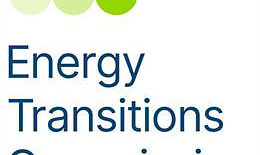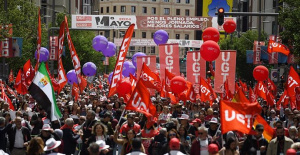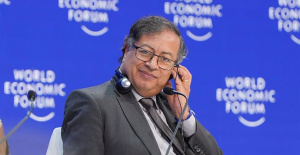Unidas Podemos proposes two ways that would allow the procedure to be suspended and give the Senate time to approve the reform
MADRID, 19 Dic. (EUROPA PRESS) -
The Constitutional Court (TC) has begun at 10:00 this Monday the plenary session where it will decide whether to admit the amparo appeal presented by the PP where it asks to suspend the parliamentary processing of two amendments by which the system of election and arrival at its own TC of the two candidates that corresponds to appoint the General Council of the Judiciary (CGPJ), a suspension that could be avoided if the magistrates follow the paths indicated by United We Can (UP).
According to the agenda provided by the court of guarantees, the eleven magistrates will begin with the deliberation and vote on the admission of the "popular" appeal to continue with the debate on the very precautionary measures demanded by the political party to prevent the reform It is approved next Thursday in the Senate.
According to the legal sources consulted, the six magistrates of the conservative majority are inclined to give free rein to the suspension of parliamentary processing, although some voices warn that there are "different enthusiasms", while the five magistrates of the progressive majority do not see with good eyes the interference in the Legislative Power.
The sources point out that the debate could be located in the recusals raised by UP against the president of the TC, Pedro González-Trevijano, and the magistrate Antonio Narváez -both located in the majority bloc--. The 'purple' party believes that they have a "direct interest" because they would be the two magistrates replaced by the two candidates nominated by the Government - the former minister Juan Carlos Campo and the former high office of Moncloa Laura Díez - if the reform remains approved.
And this is because, if González-Trevijano and Narváez do not withdraw voluntarily, a recusal motion is opened that has a suspensive effect on the entire procedure until it is resolved, for which there is a specific procedure that contemplates deadlines of several days, a parenthesis during which it would give time for the Senate to approve in its plenary session next Thursday the bill that eliminates sedition and all its amendments, including those two.
Consequently, challenges have become the main trump card to get Parliament to approve the reform before the Constitutional Court can avoid it. But, to reach this scenario, the sources stress that two conditions must be met: that the Plenary agree to debate the 'purple' request to remove González-Trevijano and Narváez, and that it do so before analyzing the very precautionary measures.
In this situation, the first stumbling block is the order of the day. It does not include the issue of challenges, so that, in the event that the progressive magistrates consider dealing with them, the decision would fall to González-Trevijano as president. In this regard, the sources recall that, although the custom is to respect the majority feeling, it does not really bind him, so he can decide what he considers appropriate.
With this resolved, the second hurdle would be when to discuss it. Some sources maintain that the issue of challenges should be addressed after resolving the admission of the 'popular' appeal and before debating the suspension of the parliamentary process. However, others understand that the especially urgent nature of the very precautionary measures is sufficient reason to resolve them before discussing the challenges.
To this, some sources add that the request to remove González-Trevijano and Narváez is made in a letter where United We Can request to appear in person -the same request that the PSOE has made in its own letter-, for which they maintain that until the TC resolves the question of appearance, neither of them are part of the procedure and it would not be possible to study the claims they make, including the challenges.
In the last few hours, UP has presented a new letter where it asks the Constitutional Court to submit a preliminary ruling to the CJEU so that the community court can clarify whether González-Trevijano and Narváez should abstain, a second way that would also lead to the suspension of the procedure until this question get an answer. Since Friday, the TC has received up to 8 new writings signed by UP, PSOE, PP and Vox.
In addition, some sources emphasize that the Organic Law of the Constitutional Court (LOTC) supports the suspension, in whole or in part, of the effects of the appealed decisions "as long as (...) it does not cause serious disturbance to a constitutionally protected interest nor to the fundamental rights or freedoms of another person".
In line, they emphasize that in its more than 40 years of history the TC has never prevented discussion and voting in the Cortes Generales, so it would be an unprecedented measure that - they allege - would cause a "serious disturbance" due to interference in the Legislative Power and the affectation of the rights of the rest of the deputies and of the citizens they represent.
However, the sources admit that the number of factors that could end up influencing the final decision makes it difficult to predict what it will be, so everything will depend on how the debate between the magistrates runs.
It should be remembered that the Congress of Deputies approved the bill with its amendments last Thursday after the president of the TC chose to suspend the extraordinary plenary session of that day and call another one for this Monday.
According to sources from the court of guarantees, he did so after the five progressive magistrates threatened not to deliberate or vote, if they were not given more time to study a matter of great "complexity" and "relevance" that they had barely heard about. 24 hours before. If they had left, they would have prevented the 'quorum' of at least 8 magistrates that is required for the Plenary to be validly constituted.

 Exploring Cardano: Inner Workings and Advantages of this Cryptocurrency
Exploring Cardano: Inner Workings and Advantages of this Cryptocurrency Seville.- Economy.- Innova.- STSA inaugurates its new painting and sealing hangar in San Pablo, for 18 million
Seville.- Economy.- Innova.- STSA inaugurates its new painting and sealing hangar in San Pablo, for 18 million Innova.- More than 300 volunteers join the Andalucía Compromiso Digital network in one month to facilitate access to ICT
Innova.- More than 300 volunteers join the Andalucía Compromiso Digital network in one month to facilitate access to ICT Innova.-AMP.- Ayesa acquires 51% of Sadiel, which will create new technological engineering products and expand markets
Innova.-AMP.- Ayesa acquires 51% of Sadiel, which will create new technological engineering products and expand markets COMUNICADO: Energy Transitions Commission (ETC) Urges Government and Industry Collaboration to Overcome Perceptions of Offshore Wind
COMUNICADO: Energy Transitions Commission (ETC) Urges Government and Industry Collaboration to Overcome Perceptions of Offshore Wind UGT and CCOO demand the regeneration of democracy, better salaries and a reduction in working hours
UGT and CCOO demand the regeneration of democracy, better salaries and a reduction in working hours Alcaraz gives up his reign in Madrid against Rublev
Alcaraz gives up his reign in Madrid against Rublev Petro announces that Colombia will break diplomatic relations with Israel
Petro announces that Colombia will break diplomatic relations with Israel How Blockchain in being used to shape the future
How Blockchain in being used to shape the future Not just BTC and ETH: Here Are Some More Interesting Coins Worth Focusing on
Not just BTC and ETH: Here Are Some More Interesting Coins Worth Focusing on Ivace and promotes a less invasive device for the early detection of prostate cancer
Ivace and promotes a less invasive device for the early detection of prostate cancer Valencia unanimously approves the ordinance to allocate spaces to test innovative initiatives
Valencia unanimously approves the ordinance to allocate spaces to test innovative initiatives UPV researchers promote a paid master's degree as a "talent factory" in integrated photonics
UPV researchers promote a paid master's degree as a "talent factory" in integrated photonics A spin-off of the UV works on obtaining high-resolution 3D biomedical images in real time
A spin-off of the UV works on obtaining high-resolution 3D biomedical images in real time A million people demonstrate in France against Macron's pension reform
A million people demonstrate in France against Macron's pension reform Russia launches several missiles against "critical infrastructure" in the city of Zaporizhia
Russia launches several missiles against "critical infrastructure" in the city of Zaporizhia A "procession" remembers the dead of the Calabria shipwreck as bodies continue to wash up on the shore
A "procession" remembers the dead of the Calabria shipwreck as bodies continue to wash up on the shore Prison sentences handed down for three prominent Hong Kong pro-democracy activists
Prison sentences handed down for three prominent Hong Kong pro-democracy activists ETH continues to leave trading platforms, Ethereum balance on exchanges lowest in 3 years
ETH continues to leave trading platforms, Ethereum balance on exchanges lowest in 3 years Investors invest $450 million in Consensys, Ethereum incubator now valued at $7 billion
Investors invest $450 million in Consensys, Ethereum incubator now valued at $7 billion Alchemy Integrates Ethereum L2 Product Starknet to Enhance Web3 Scalability at a Price 100x Lower Than L1 Fees
Alchemy Integrates Ethereum L2 Product Starknet to Enhance Web3 Scalability at a Price 100x Lower Than L1 Fees Mining Report: Bitcoin's Electricity Consumption Declines by 25% in Q1 2022
Mining Report: Bitcoin's Electricity Consumption Declines by 25% in Q1 2022 Oil-to-Bitcoin Mining Firm Crusoe Energy Systems Raised $505 Million
Oil-to-Bitcoin Mining Firm Crusoe Energy Systems Raised $505 Million Microbt reveals the latest Bitcoin mining rigs -- Machines produce up to 126 TH/s with custom 5nm chip design
Microbt reveals the latest Bitcoin mining rigs -- Machines produce up to 126 TH/s with custom 5nm chip design Bitcoin's Mining Difficulty Hits a Lifetime High, With More Than 90% of BTC Supply Issued
Bitcoin's Mining Difficulty Hits a Lifetime High, With More Than 90% of BTC Supply Issued The Biggest Movers are Near, EOS, and RUNE during Friday's Selloff
The Biggest Movers are Near, EOS, and RUNE during Friday's Selloff Global Markets Spooked by a Hawkish Fed and Covid, Stocks and Crypto Gain After Musk Buys Twitter
Global Markets Spooked by a Hawkish Fed and Covid, Stocks and Crypto Gain After Musk Buys Twitter Bitso to offset carbon emissions from the Trading Platform's ERC20, ETH, and BTC Transactions
Bitso to offset carbon emissions from the Trading Platform's ERC20, ETH, and BTC Transactions Draftkings Announces 2022 College Hoops NFT Selection for March Madness
Draftkings Announces 2022 College Hoops NFT Selection for March Madness



























